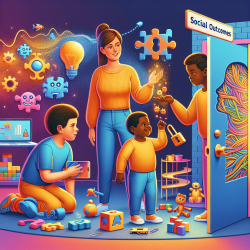The COVID-19 pandemic has forced a reevaluation of how interventions for children with intellectual and developmental disabilities (IDD) are delivered. The research article "Adapting parent-focused interventions for diverse caregivers of children with intellectual and developmental disabilities: Lessons learned during global crises" provides invaluable insights into how practitioners can adapt their approaches to better serve diverse communities. This blog post explores the key findings from this research and offers practical advice for practitioners looking to improve their skills in delivering parent-focused interventions.
The Importance of Parent-Focused Interventions
Parent-focused interventions have long been recognized as effective strategies for supporting children with IDD. These interventions empower parents to become active participants in their child's development, leveraging their unique insights and consistent presence to foster positive outcomes. However, the traditional face-to-face delivery model faced significant challenges during the pandemic, necessitating rapid adaptations to ensure continued support for families.
Adapting Interventions During Global Crises
The pandemic highlighted the need for flexible intervention models that can be adapted to various cultural and socioeconomic contexts. The research identified several key areas where adaptations were necessary:
- Recruitment and Retention: Engaging diverse populations required innovative strategies beyond traditional methods. Online recruitment through social media platforms proved effective in reaching a broader audience but also presented challenges in maintaining participant engagement.
- Instrumentation and Measurement: Many existing assessment tools were not adequately adapted for remote use or for culturally diverse populations. Practitioners need to consider culturally responsive tools and alternative methods to accurately assess child development and intervention outcomes.
- Intervention Delivery: Transitioning to telehealth required significant adjustments in how interventions were delivered. This included shorter session durations, asynchronous content delivery, and providing families with necessary technology support.
Lessons Learned and Recommendations
The research offers several recommendations for practitioners looking to enhance their skills in delivering parent-focused interventions:
- Cultural Adaptation: Practitioners should prioritize cultural adaptations in all aspects of intervention research, from recruitment practices to intervention delivery. Building trust within communities is essential for successful engagement.
- Flexibility: Embrace flexibility in planning and executing interventions. This includes allowing for cancellations, adjusting session formats, and continuously checking in with families to ensure practices remain feasible.
- Community Engagement: Establishing strong relationships with community organizations is crucial. These partnerships can facilitate trust-building and provide valuable insights into the needs of diverse populations.
- Holistic Approach: Recognize that children and families do not exist in isolation but are part of complex systems. Addressing systemic issues that contribute to disparities is an ethical responsibility for practitioners.
The Path Forward
The experiences shared in the research underscore the importance of adaptability and cultural sensitivity in delivering effective parent-focused interventions. By implementing these recommendations, practitioners can enhance their skills and contribute to more inclusive and equitable support systems for children with IDD and their families.
To read the original research paper, please follow this link: Adapting parent-focused interventions for diverse caregivers of children with intellectual and developmental disabilities: Lessons learned during global crises.










